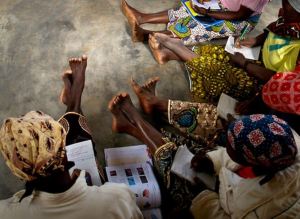Christof Lehmann (nsnbc) : Over 90 percent of Mozambicans were illiterate when the country gained its independence from Portugal in 1975. Today over 40 percent of Mozambicans are illiterate with marked differences between the capital and rural districts.
 Speaking on the occasion of International Illiteracy Day on Friday, Laurino Nhacune, Mozambique’s National Directorate of Literacy and Adult Education, said the government is determined to reduce the illiteracy rate to 41 per cent by 2019.
Speaking on the occasion of International Illiteracy Day on Friday, Laurino Nhacune, Mozambique’s National Directorate of Literacy and Adult Education, said the government is determined to reduce the illiteracy rate to 41 per cent by 2019.
In 1975 when Mozambique gained its independence from Portugal, it was estimated that some 93 percent of Mozambicans were illiterate. By 2017 illiteracy is estimated to have fallen to some 44.9 percent.
“This growth shows the evolution of the literacy services since independence, and now our perspective is to reduce the illiteracy rate to 41 per cent, by the end of this government’s term of office”, said Nhacune.
He said that currently there are 571,000 people attending the literacy centres across the country, who are being taught to read and write by 15,000 volunteers. They receive, not a wage, but an allowance, which amounts to a total of 125 million meticais (just over two million dollars) a year.
The subsidies are extremely low, and certainly do not provide much of an incentive. They are about 650 meticais (about 10.5 US dollars) a month. The province with the highest illiteracy rate, Nhacune said, remains Cabo Delgado in the far north where 60.7 per cent of the population cannot read or write. The lowest rate is 9.5 per cent, in Maputo City.
According to the United Nations Educational, Scientific and Cultural Organisation (UNESCO), there are 750 million adults in the world who lack even the most basic literacy skills.
Mozambique has since it gained its independence in 1975 been ruled by the socialist Frelimo party. The country went through a 16-year-long civil war between Frelimo and Renamo. The civil war reflected cold-war dynamics. Frelimo was strongly supported by the Soviet Union (USSR), among others.
Renamo was supported by the then Apartheid-ruled South Africa, by the then British colony Rhodesia (now Zimbabwe), former Portuguese oligarchical circles, the United States and other western powers who described Renamo as “rebels and freedom fighters”.
The civil war ended with a ceasefire agreement signed in the Italian capital Rome in 1992, bringing the civil war to an end in 1993. However, the country has never been fully pacified and “peace talks” between the socialist Frelimo government and Renamo are dragging on until today (2017). Ironically, Renamo is still a party represented in parliament and an illegal armed militia.
The situation in Mozambique brings to mind the apparently endless debates about Dukor’s “African Unfreedom” versus those who would rather find causes for African countries’ current situation in the actions and activities of contemporary African leaders, governments, and communities.
Many, especially Frelimo supporters, would argue that the country’s 45 percent illiteracy are a legacy of colonialism and neo-colonialism. Many Frelimo supporters would also argue that the civil war delayed educational programs as well as infrastructure programs needed to accumulate funds and to bring education to the people. Many Renamo supporters would agree with that point, even though both parties would rather blame each other than working together to solve the crisis.
Many supporters of Renamo and other opposition parties would stress the irony that the “socialist” Frelimo has ruled Mozambique since 1975 and the 45 percent of “the average people” are still illiterate while only some 9 percent of the population in the capital Maputo, the hotbed of government, oligarchy, duplicity and corruption, are illiterate. The most discouraging fact may be that all of the above mentioned arguments have at least some degree of validity. On the other hand, one might hope that an honest debate about prioritizing party politics and nepotism higher than education and infrastructure might pave the way toward less pathological and more pragmatic, result-oriented policies and projects.
CH/L – nsnbc 09.09.2017
Source Article from https://nsnbc.me/2017/09/09/oh-no-not-dukor-again-illiteracy-rate-in-mozambique-hovers-around-45-percent/
 RSS Feed
RSS Feed















 September 9th, 2017
September 9th, 2017  Awake Goy
Awake Goy 










 Posted in
Posted in  Tags:
Tags: 













